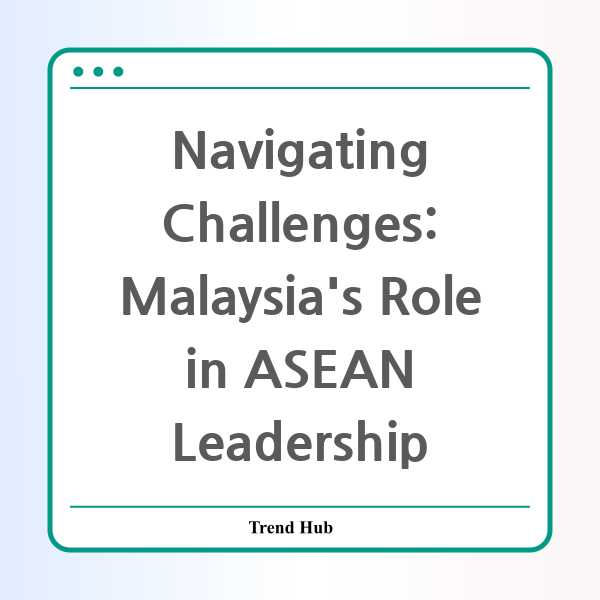* This website participates in the Amazon Affiliate Program and earns from qualifying purchases.

Can Malaysia Navigate ASEAN's Turbulent Waters?
As Malaysia takes over the chairmanship of the Association of Southeast Asian Nations (ASEAN), the stakes have never been higher. With rising trade tensions, geopolitical challenges, and crises in neighboring regions, Prime Minister Anwar Ibrahim's leadership will be tested like never before. How can Malaysia leverage its position to foster cooperation and stability in a landscape fraught with challenges?
ASEAN, representing the fifth-largest economy globally with a combined GDP of approximately USD 3.6 trillion, is at a crossroads. Malaysia's Prime Minister Anwar, who has a long history of political resilience and international diplomacy, has a unique opportunity to steer ASEAN through these turbulent times. His ability to build relationships and navigate complex situations will be critical in addressing concerns such as tariffs, the South China Sea tensions, and the ongoing humanitarian crisis in Myanmar.
Anwar's recent diplomatic engagements—spanning visits to significant global players such as China, the United States, India, Russia, and Turkey—underscore a strategic pivot towards enhancing Malaysia's international standing and addressing pressing security challenges. As critiques arise over ASEAN's perceived ineffectiveness as a "talking shop," the spotlight will be on Malaysia to facilitate impactful decisions that address the pressing issues facing the region.
A key aspect of Malaysia's leadership will involve setting the agenda for critical discussions on trade, security, and economic collaboration among member states. The ASEAN chairmanship is not merely symbolic; it carries substantial responsibilities in terms of diplomacy and governance. However, the consensus-driven nature of ASEAN can often stymie decisive action, making it imperative for Malaysia to find a balance between dialogue and tangible outcomes.
Support for Malaysia's leadership is emerging from unexpected quarters; France has expressed its commitment to working closely within the ASEAN framework. French Ambassador to Malaysia, Axel Cruau, emphasized the importance of Malaysia's role for ASEAN this year, anticipating significant progress in initiatives focused on security, peace, and stability. His remarks highlight Malaysia's centrality in fostering collaboration among ASEAN nations and underline the need for inclusivity and sustainability in policy-making.
Looking forward, the challenges for Malaysia's presidency are multifaceted. On one hand, there’s the necessity to respond to economic pressures exacerbated by tariff disputes and competition for resources. On the other hand, there's the pressing need for collective action in addressing regional conflicts that threaten peace and stability. With Anwar's government prioritizing international relations, the hope is that Malaysia can galvanize ASEAN to address these pressing issues proactively.
Ultimately, how effectively Malaysia can navigate these challenges will define its legacy as ASEAN's chair. The world will be watching; will Malaysia rise to the occasion and transform challenges into opportunities for collaboration, or will it succumb to the constraints of consensus-driven decision-making? As the year unfolds, the spotlight will remain firmly on Malaysia and its strategies to redefine ASEAN's role on the global stage.
With Anwar's experience, Malaysia has the potential to not just manage crises but also to lead ASEAN into a new era of strategic significance, where inclusivity and sustainability are at the forefront of diplomatic efforts. The path may be fraught with challenges, but the opportunity to make a lasting impact is undeniably within reach.
* This website participates in the Amazon Affiliate Program and earns from qualifying purchases.